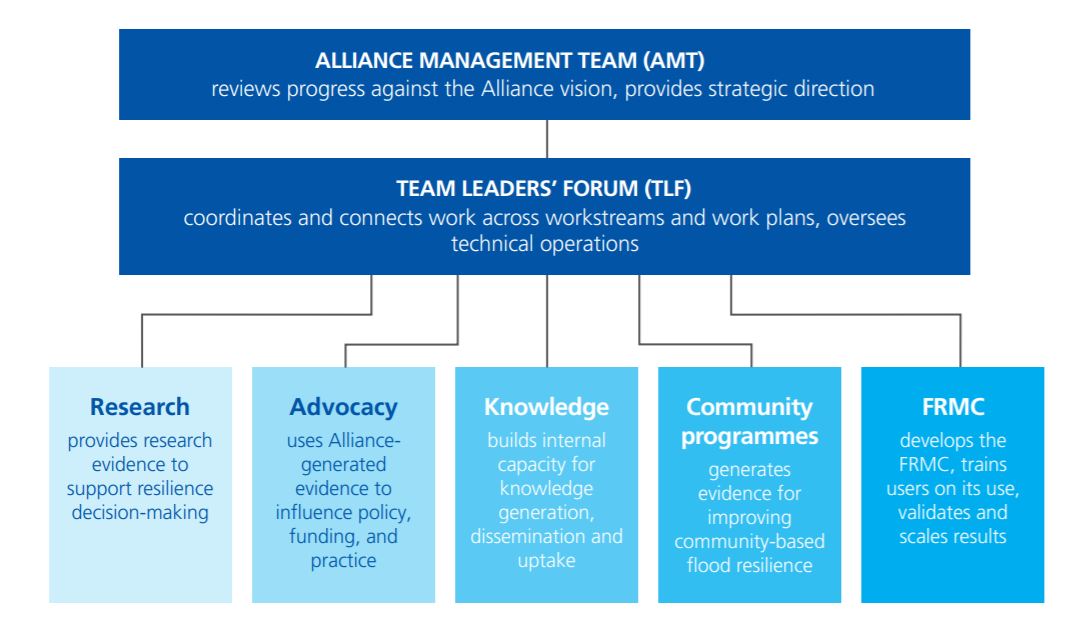The Zurich Flood Resilience Alliance entered its second phase in July 2018. Since then we have worked hard at creating an effective, collaborative, and innovative approach to disaster resilience programming, coupled with a new type of monitoring and reporting system that will allow us to regularly assess our impact and adaptively manage the programme. Recognising that partnerships are essential for reaching climate goals, we want to share our achievements and the knowledge we’ve gained so that others can learn from it to create resilience and adaptation programmes that go beyond business as usual.
Who is the Alliance?
The Zurich Flood Resilience Alliance is a multi-sectoral partnership bringing together organisations with different experiences and expertise that contribute to reaching our common vision, that floods should have no negative impact on people’s abilities to thrive. To achieve this we are working to increase funding for flood resilience, strengthen global, national, and sub-national policies, and improve flood resilience practice.
The Alliance was originally launched in 2013 with the goal of shifting focus from flood response and recovery to pre-event risk reduction. Based on the successes achieved in this first phase, the Z Zurich Foundation extended funding for a second five-year phase in 2018. You can learn more about the Alliance and our nine partners here.

What have we done in the first year of this second phase?
Working as a large multi-partner and multi-sectoral Alliance has required this first year to focus on the creation of effective internal systems and structures, as well as building strong working relationships. We have intentionally invested time and effort in understanding, and learning from one another’s different incentive structures, goals and values.
This has required patience and flexibility. The payoff has been in the opportunity to harness diverse strengths and skills of our partners, and build knowledge and capacity within the Alliance on areas of flood resilience and systems thinking. At the end of the first year we have developed trust and collaboration between partners, and an effective Alliance-wide governance system.

To guide our work and support effective collaboration, we have developed nested global and national Theories of Change for the Alliance and, as we felt that most existing reporting approaches are limited to listing outputs and activities, a that emphasises results and impacts, and fosters mutual learning.
What change have we achieved?
Despite this first year largely being a set up phase, our success includes influencing the commitment of nearly 24 million USD and the disbursement of over one million USD for flood resilience. In the process of implementing the Flood Resilience Measurement for Communities (FRMC) we have directly engaged with, and built the capacity of over 4,400 people. This engagement will lead to interventions that will benefit more than 115,000 residents across the communities we work in.
We have also made progress in areas which will enable us to see change take place over coming years. Over the past year we have finalised and rolled out the next generation of the FRMC in seven languages and started implementation in 70 communities across 8 countries. We have raised the profile of the Alliance, developed relationships with diverse stakeholders, accessed policy dialogues on global and national levels, and integrated our messages into high level policy recommendations. We have also developed research and knowledge outputs which have achieved widespread readership, successfully influenced national level flood resilience and funding, and influenced external replication and scaling of the FRMC. For more details on some of these achievements see the Executive Summary of our learning report.

What lessons can we share?
The role of Zurich in the Alliance is not that of a traditional donor, but also a partner adding weight, topical knowledge and visibility as a global corporation. Based on the opportunities we are experiencing as a result of Zurich’s engaged partnership, we want to encourage more donors to adopt this type of non-traditional donor role.
The long-term systemic change we are seeking requires working across multiple sectors and scales. Our workstream structure supports sector specific work, while cross-workstream collaboration allows us to aggregate that work to deliver shared objectives.
Our work illustrates that flexible, holistic programmes, informed by local contexts, are vital to achieving innovative results. Zurich’s long-term funding model, coupled with flexible programming and community-driven intervention selection, has already resulted in new practices, community ownership of results, and scaling by communities and national government alike. This is further supported by our systems thinking approach, which has helped us build the capacity of internal partners and external actors to explore problems more holistically, to understand the interconnections, and to see new entry points for action.
However, this approach does not necessarily fit within traditional impact measurements. Measuring input and output is easy but to fully assess the impact of long term resilience programmes like the Alliance we need to capture not only lives improved and dollars spent but also ‘intangibles’ such as the knowledge gained regarding key vulnerabilities and risks.
We believe that these insights illustrate a new way forward for implementing programmes that are beneficial for communities and organisations alike. To deliver such programming differently from business-as-usual, to truly tailor it to local needs and contexts, we need funding that provides the time and flexibility needed for innovation and learning. We hope that our demonstration of success in this new way of working will push the wider resilience sector to take a chance, to experiment, and to learn and adapt.

Comments